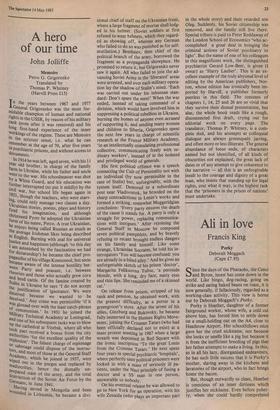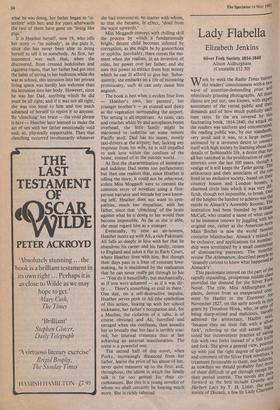Ali in love
Francis King
Porky Deborah Moggach (Cape £7.95)
Since the days of the Pharaohs, the Cenci and Byron, incest has come down in the world. Like bingo, dog-racing, going on strike and eating baked beans on toast, it is now generally, if fallaciously, regarded as a working-class activity. This view is borne out by Deborah Moggach's Porky.
Porky is Heather, daughter of a former fairground worker, whose wife, a cold cut above him, has forced him to settle down on a small-holding out on the A4, close to Heathrow Airport. Her schoolfellows once gave her the cruel nickname, not because she looks or smells like a pig but because it is from the inefficient breeding of pigs that her father attempts to make a living. In this, as in all his lazy, disorganised endeavours, he has such little success that it is Porky's mother, slaving away in the kitchens and lavatories of the airport, who in fact brings home the bacon.
But, though outwardly so clean, Heather is conscious of an inner dirtiness which justifies her nickname. Even before puber- ty, when she could hardly comprehend what he was doing, her father began to 'in- terfere' with her; and for years afterwards the two of them have gone on 'living like pigs.'
It is Heather herself, now 19, who tells her story — `to nobody', as she puts it, since she has never been able to bring herself to tell it to somebody. At first, her innocence was such that, when she discovered, from creased bedclothes and cigarette traces, that her father had got into the habit of sitting in her bedroom while she was at school, this intrusion into her private living space was hardly less welcome than his intrusion into her body. However, since he was her Dad, anything which he did must be all right; and if it was not all right, she was too loyal to him and too much ashamed of herself to report it to anyone. By 'clenching' her brain — the vivid phrase is hers — Heather later learned to make the act of sex with her father emotionally void and, so, physically supportable. Then that clenching occurred involuntarily whenever she had intercourse, no matter with whom, so that she became, in effect, 'dead from the waist upwards.'
Miss Moggach conveys with chilling skill the process by which a fundamentally bright, decent child becomes infested by corruption, as she might be by gonorrhoea or syphilis. Inevitably, there comes the mo- ment when she realises, in an inversion of roles, her power over her father; and she uses this power to extract from him money which he can ill afford to give her. Subse- quently, she embarks on a life of increasing promiscuity, such as can only cause him anguish.
The book is best when it evokes four lives — Heather's own, her parents', her younger brother's — as stunted and dusty as the vegetation surrounding the airport. The setting is all-important. As taxis, cars and coaches whizz by and aeroplanes boom overhead, the little family might be marooned in isolation on some remote Pacific atoll. Dad has his mates, mostly taxi-drivers at the airport; but, lacking any response from his wife, he is still impelled to seek love within the confines of the home, instead of in the outside world.
At first the characterisation of immature and indolent Dad seems too perfunctory; but then one realises that, since Heather is telling the story, it could not be otherwise, unless Miss Moggach were to commit the common error of novelists using a first- person narrator and intrude her own know- ing self. Heather does not want to sym- pathise, much less empathise, with her father, since that 'clenching' of the brain against what he is doing to her would then become impossible. As far as she is able, she must regard him as a stranger.
Eventually, by now an air-hostess, Heather meets up with Ali, a rich Pakistani. Ali falls so deeply in love with her that he abandons his career and his family, comes to England and takes a flat in Earls Court, where Heather lives with him. But though their days pass in a haze of constant love- making, he is maddened by the realisation that he can never really get through to her — 'You do it beautifully, but mechanically, as if you were ashamed — as if it was dir- ty ... There's something so cold in there.' One day, on a self-destructive impulse, Heather serves pork to Ali (the symbolism of this action, linking up with her school nickname, her father's occupation and, for a Muslim, the violation of a tabu, is of course obvious) and Ali, horrified and enraged when she confesses, then assaults her so brutally that her face is terribly scar- red, her internal traumata thus at last achieving an external manifestation. The scene is a powerful one.
The second half of this novel, when Porky, increasingly distanced from her father, learns the price of his abuse of her, never quite measures up to the first; and, throughout, the idiom in which the family talk is far too genteel for their cir- cumstances. But this is a young novelist of whom we shall certainly be hearing much more. She is richly talented.











































 Previous page
Previous page